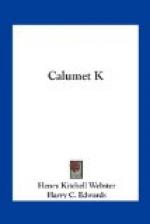Five minutes after the noon whistle blew, on Saturday, every carpenter and laborer knew that Bannon had “pulled a gun” on Reilly. Those who heard it last heard more than that, for when the story had passed through a few hands it was bigger and it took longer to tell. And every man, during the afternoon, kept his eyes more closely on his work. Some were angry, but these dropped from muttering into sullenness; the majority were relieved, for a good workman is surer of himself under a firm than under a slack hand; but all were cowed. And Bannon, when after dinner he looked over the work, knew more about all of them and their feelings, perhaps, than they knew themselves. He knew, too, that the incident might in the long run make trouble. But trouble was likely in any case, and it was better to meet it after he had established his authority than while discipline was at loose ends.
But Hilda and Max were disappointed. They were in the habit of talking over the incidents and problems of the day every night after supper. And while Hilda, as Max used to say, had a mind of her own, she had fallen into the habit of seeing things much as Max saw them. Max had from the start admired, in his boyish way, Peterson’s big muscles and his easy good nature. He had been the first to catch the new spirit that Bannon had got into the work, but it was more the outward activity that he could understand and admire than Bannon’s finer achievements in organization. Like Hilda, he did not see the difference between dropping a hammer down a bin and overloading a hoist. Bannon’s distinction between running risks in order to push the work and using caution in minor matters was not recognized in their talks. And as Bannon was not in the habit of giving his reasons, the misunderstanding grew. But more than all Max felt, and in a way Hilda felt, too, that Peterson would never have found it necessary to use a revolver; his fists would have been enough for a dozen Reillys. Max did not tell Hilda about all the conversations he and Peterson had had during the last week, for they were confidential. Peterson had never been without a confidant, and though he still shared a room with Bannon, he could not talk his mind out with him. Max, who to Bannon was merely an unusually capable lumber-checker, was to Peterson a friend and adviser. And though Max tried to defend Bannon when Peterson fell into criticism of the way the work was going, he was influenced by it.
During the few days after the accident Hilda was so deeply distressed about the injured man that Max finally went to see him.
“He’s pretty well taken care of,” he said when he returned. “There’s some ribs broken, he says, and a little fever, but it ain’t serious. He’s got a couple of sneaking little lawyers around trying to get him to sue for damages, but I don’t think he’ll do it. The Company’s giving him full pay and all his doctor’s bills.”
Nearly every evening after that Max took him some little delicacy. Hilda made him promise that he would not tell who sent them.




